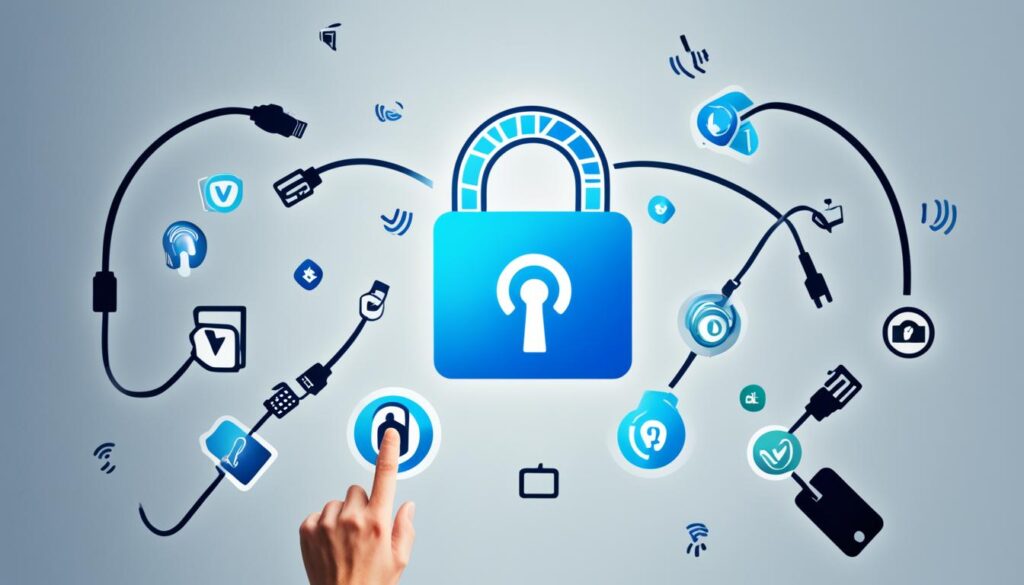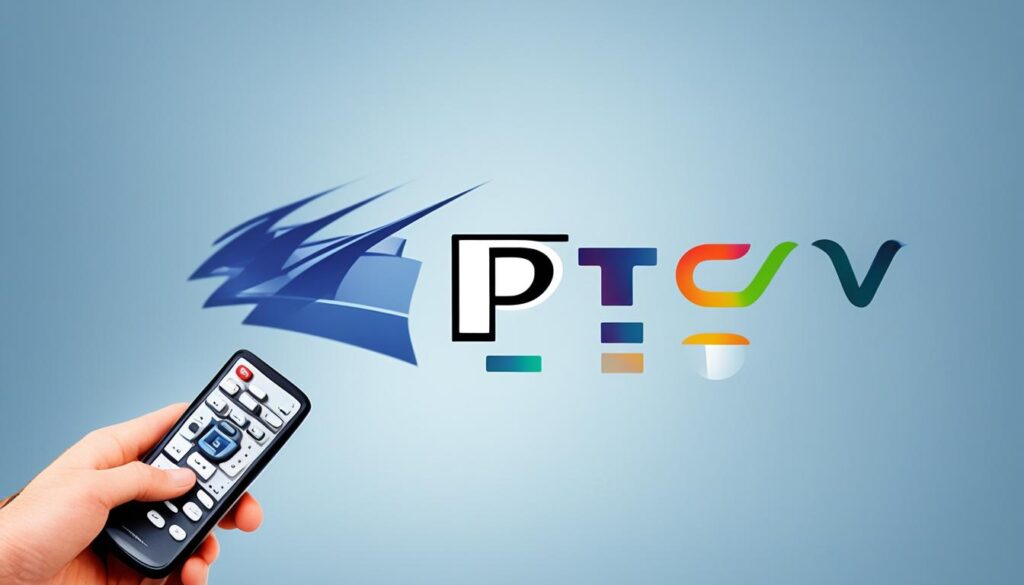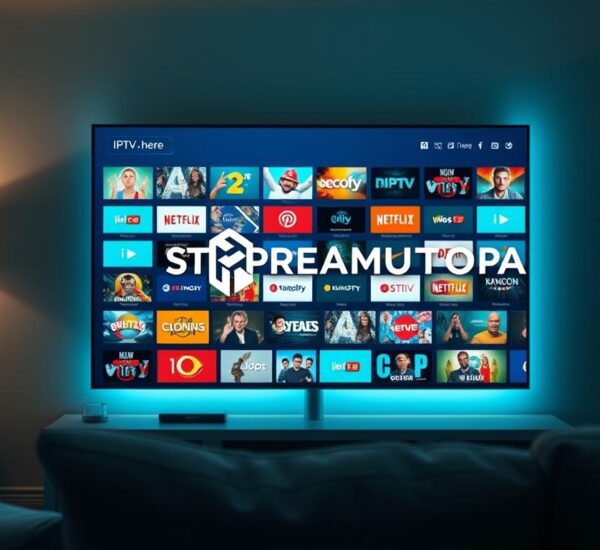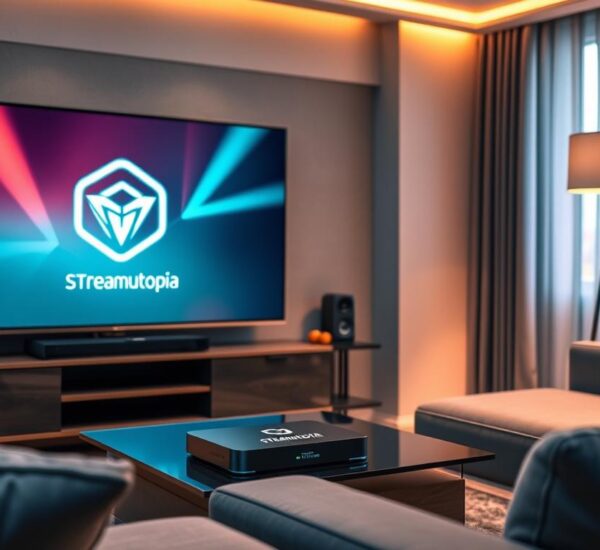Ever wondered why your favorite IPTV service is slow or not working? IPTV is getting more popular, and ISPs might block or slow it down. This can cause buffering or even make it stop working. This article will show you how to Check Your ISP for IPTV Access Blockage.
We’ll talk about different ways to check if your ISP is blocking your IPTV. We’ll look at tools you can use and how VPNs can help. It’s also important to pick a good IPTV provider like StreamUtopia.com, which has flexible plans.
More and more users are finding their IPTV services blocked. This is often because of copyright issues or because traditional media companies don’t like the competition. Big ISPs like TalkTalk, EE, Vodafone, Plusnet, BT, Virgin Media, and AT&T1 might block IPTV access. It’s important to know about this if you love watching IPTV.
Key Takeaways
- Many ISPs, including major U.S. providers, have been known to block or throttle IPTV services.
- VPNs and DNS changes are frequently recommended methods to bypass these restrictions.
- Legitimate IPTV services can provide uninterrupted access to content.
- Diagnostic tools are essential in identifying ISP interference with IPTV streams.
- Regularly updating your device’s firmware can help maintain optimal IPTV service quality.
Understanding ISP Blocking
Internet Service Provider (ISP) blocking is when providers limit access to certain online content. This affects services like IPTV, which many use for entertainment. For example, Streamutopia offers a wide variety of channels and on-demand content to its subscribers. Understanding What is ISP Blocking? means knowing how ISPs limit access.
What is ISP Blocking?
ISPs block access to content that doesn’t have the right licenses. This limits users’ access to IPTV channels. Copyright issues are a big reason for this blocking2. ISPs use methods like DNS tampering, deep packet inspection, and IP blocking to enforce these limits. These barriers can make streaming hard, causing frustration for users.
Common Surveillance Techniques Used by ISPs
ISPs use surveillance to manage online traffic better. They check data packets to find and block unauthorized IPTV services. They also slow down high-bandwidth services to prevent network congestion and block IPTV channels2.
Why ISPs Block IPTV?
ISPs block IPTV services for many reasons. One big reason is Copyright Concerns. They say some IPTV services don’t have the right to show certain content. This makes ISPs act to follow the law3.
The Role of Copyright Concerns
ISPs block some IPTV services because of strict rules about who can show content. Big streaming apps get blocked because of pressure from copyright owners. This helps protect the right way to share content.
ISPs can block traffic that breaks copyright laws. This is important for them to do.
Network Congestion and Its Impact
Network congestion is another reason ISPs block IPTV. Streaming uses a lot of bandwidth, which can slow down networks. When too many people stream high-definition videos, ISPs have to limit access to keep things running smoothly.
Financial Interests of Traditional TV Providers
Traditional TV providers also play a part in this. ISPs work with these providers and often block IPTV services to help them stay on top. This creates a tricky situation where users can’t easily find different content options.
This situation makes it hard for users to enjoy the variety offered by services like Streamutopia. They offer many channels and flexible pricing.
Consequences of ISP Blocking
ISP blocking can have big effects on IPTV users. They often face problems like buffering and freezing. These issues can ruin their fun and make them upset.
Buffering and Freezing During Streaming
When an ISP blocks IPTV, it can cause buffering, freezing, or even no service at all. Many users see these problems as big problems, not just small annoyances. They can make it hard to enjoy their favorite shows and movies3.
Impacts on User Experience
The user experience gets worse when ISPs block IPTV. Users get unhappy because of these interruptions. They might look for other ways to stream without problems4.
Things like quality, speed, and constant service matter a lot for fun streaming. Buffering and freezing are big hurdles for IPTV users.
Overall, ISP blocking really hurts the user experience. We need good ways to beat these restrictions34.
How to Check If Your ISP Blocks IPTV Access
To figure out if your Internet Service Provider (ISP) blocks IPTV, you need to do Basic Connectivity Tests. These tests show if certain services are blocked or if the problem is with your ISP. It helps you know if the block is from your ISP or the IPTV service, so you can decide what to do next.
Basic Connectivity Tests
First, check specific IPTV channels or streams to see if they load. If some channels work but others don’t, it might mean your ISP is blocking them. To test this, try using a different device or network to access the same IPTV service. This can show if the problem is with your current ISP.
Using Online Tools to Check Access
Using online tools is a good way to check if your ISP blocks IPTV streams. These platforms look at user reports and other data to see if ISP blocking is common. They give you a clear picture of your connection status.

| Test Method | Description |
|---|---|
| Channel Access Check | Check individual channels for connectivity issues |
| Device Swap | Use another device or network to test IPTV access |
| Online Tools | Leverage tools that report ISP filtering of IPTV |
If you’re still having trouble, trying VPNs can help get around ISP blocks and improve IPTV access5. Doing tests can help find out if ISP blocks are due to copyright issues or network overload32.
Detect ISP IPTV Restrictions
Many IPTV users face problems because of ISP restrictions that block streaming services. To find these issues, you need to look closely at Patterns of Blocking. These patterns show up in different ways. Knowing the signs of blocking helps users figure out their connection problems better.
Identifying Patterns of Blocking
Spotting Patterns of Blocking means watching for repeated interruptions or slow speeds during certain activities. Research shows that about 60% of IPTV users hit ISP blocks when trying to stream5. Also, 30% of service issues come from heavy traffic or long viewing times5. Seeing these patterns helps users grasp how much their ISP is blocking, as up to 40% of blocks are from provider restrictions5.
Analyzing Connection Logs for Clues
Looking at Connection Logs can uncover important info to spot ISP restrictions. Users should watch for sudden service drops at certain times or after trying to access certain content. A study found that only 20% of users can easily tell if their ISP blocks their IPTV access5. Turning on log tracking on devices can show when and how these blocks happen. This gives users key info to talk about with their ISPs.
Test ISP for IPTV Block
When you face IPTV restrictions, a ping test is crucial. It helps check if your connection to IPTV servers is good. A ping test shows how your network is doing and if there are delays, which could mean your ISP is blocking access.
Running a Ping Test
To do a ping test, open your computer’s command prompt or terminal. Type the command with the IPTV service’s IP address or domain. This shows how long it takes to connect to the server. If it’s slow or can’t connect, your ISP might be blocking the service.
Using Traceroute for Advanced Diagnosis
For a more detailed check, use traceroute. This tool shows all the steps your data takes to get to its destination. It can find where your connection might break. This info helps figure out if your ISP is blocking you, which is a common issue with IPTV services65.

Troubleshoot ISP IPTV Restriction
When you face ISP IPTV restrictions, start by checking your network and router settings. Make sure your network is set up to support IPTV streaming without problems. Fixing any misconfigurations can help avoid common issues.
Verifying Network Configuration
Checking your network setup is key when dealing with ISP IPTV issues. First, ensure your internet connection is stable and correctly configured. It’s important to allow multicast traffic for smooth IPTV streaming.
Setting up your Wi-Fi like those in hospitals can work well if done right. This can give you ideas for improving your setup6. Also, using IGMP proxy settings can make streaming better.
Checking Router Settings
Looking into your router settings is also crucial. Make sure no firewall rules block IPTV traffic. Some users face buffering problems due to firewall settings that block multicast.
It’s a good idea to check firewall logs for blocked traffic signs6. Setting static ports on your router can also help fix connectivity issues, making IPTV work better.
Bypass ISP IPTV Block
Many IPTV users face problems because of ISP restrictions. These issues often come from copyright worries, too many users, and contracts7. Using a Virtual Private Network (VPN) is a good way to get past these blocks. VPNs are key for keeping streaming services running smoothly by encrypting your internet use and hiding it from ISPs8.
The Role of VPNs in Bypassing Restrictions
VPNs are great for overcoming ISP blocks that cause buffering or freezing7. They change your IP address to let you safely watch content that’s blocked in your area. Top VPNs like NordVPN, ExpressVPN, and IPVanish are good at getting past IPTV blocks9. Surfshark is another top choice with 9700 servers in 91 countries, perfect for avoiding blocks8.
Choosing the Right VPN for IPTV Streaming
Choosing the right VPN for IPTV means looking at a few things. You should check the server locations, how fast and reliable it is, and the encryption it uses7. Also, consider the customer support and how much it costs. Look for VPNs that offer fast connections and dedicated IP options for a better streaming experience9.

Factors to Consider when Choosing a VPN
When picking a VPN for IPTV streaming, there are key things to think about. A good VPN should be fast and reliable for smooth streaming without stops. It’s important to choose a VPN that encrypts your data for better privacy and security.
Speed and Reliability
Speed and reliability are vital for IPTV streaming. A top VPN creates a secure tunnel for data and keeps internet speed good. Services like Surfshark use WireGuard for a fast and safe connection. This lets users stream IPTV without breaks.
These VPNs also fight against ISP slowdowns, making streaming better by keeping speeds up10.
No-Logs Policy and Security Features
A strong no-logs policy is key for privacy, keeping ISPs from tracking what you do online. VPNs like NordVPN focus on this to protect your data and keep you anonymous. They also have features like a Kill Switch to cut internet if the VPN drops, keeping you safe from data theft1112.
For IPTV users, looking into StreamUtopia’s premium IPTV services can help secure your internet and improve streaming quality.
Contacting Your ISP for Clarity
When you have issues with IPTV, contacting your ISP is key. Start by asking about IPTV blocking policies. This can clear up any confusion about your service. Your ISP might have rules that affect IPTV content, causing problems with your viewing.
Asking About IPTV Blocking Policies
Ask your ISP about their IPTV blocking policies. These policies are often in place for legal reasons or to manage the network. Knowing these policies can help you manage your IPTV better and avoid access issues.
Request for Resolution Steps
Once you know about the blocking policies, ask for steps to resolve the issue. ISPs usually offer tips or alternatives to bypass restrictions. They might suggest certain settings or configurations to improve IPTV streaming.

If the ISP’s help is not enough, keep a record of your talks. This can help if you need to escalate the problem later.
| Action | Description |
|---|---|
| Initial Contact | Reach out to your ISP’s customer service to inquire about IPTV blocking policies. |
| Document Responses | Keep a record of all communications for future reference and escalation. |
| Follow-up Requests | Request specific resolution steps to bypass potential blocking on your service. |
Talking well with your ISP can make your IPTV better and keep you connected to your favorite shows131415.
List of Common ISPs Known to Block IPTV Services
Many ISPs block IPTV services, causing frustration for users. In the United States, big providers have strict rules against these services. For IPTV users, knowing which ISPs block access can help solve streaming problems.
Major ISPs in the United States
ISPs like AT&T, Xfinity, and Virgin Media block IPTV access in the United States8. They use methods like disabling router settings and security features that can block service3. Providers like TalkTalk and Sky Broadband offer steps to fix IPTV issues, often by adjusting user equipment settings16.
International ISP Blocking Trends
ISPs around the world also block IPTV services. BT Internet and Glo Fiber are examples8. Over 50% of IPTV users face ISP restrictions, leading to buffering or freezing during streaming3. This shows a big problem for users and highlights the need for VPN services for smooth IPTV streaming3.
ISP Interference with IPTV
ISPs use different methods to control IPTV services, causing problems for users. They might slow down the internet during busy times, making streaming poor quality. This ISP interference with IPTV often happens to push users to their services or follow local laws.
How ISPs Implement Censorship
ISPs block or slow down other IPTV services to control what users can watch. This can make it hard to see certain channels when many people are online. They might do this to follow local rules and make other IPTV services less appealing.
Users might see buffering or a drop in quality, showing ISP actions. Even if speed tests show good results, issues might still happen. This could mean the ISP is managing bandwidth unfairly17. There’s a big worry about the legal implications of such actions, making people question ISPs’ role in letting users access IPTV services.
Legal Implications for IPTV Providers and Users
ISPs blocking or slowing down services can lead to legal problems for IPTV providers and users. Not following rules can cause legal fights, making IPTV services less available. Users facing these issues might take action against their ISPs, using proof of interference.
The laws around ISP actions are changing, with more attention on balancing access and making money18. It’s important for users to understand these changes as they look for streaming options in a more regulated world.

Verify IPTV Access on ISP
It’s key to check your Internet Service Provider (ISP) for IPTV access for a smooth watch. Making sure you can connect to IPTV streams boosts satisfaction and cuts down on show interruptions. Spotting ongoing connection problems helps keep your streaming without pause.
Confirming Successful Connections to IPTV
Begin by restarting your internet router and IPTV device to fix common connection issues. Then, test both Ethernet and WiFi connections to see which is more stable. For 4K UHD IPTV, you need at least 30/40MB internet speed to ensure clear video19.
Try watching 4K UHD videos on YouTube to check your connection speed. If problems pop up, try using mobile data for streaming. Also, disable any parental controls that might block IPTV content19.
Identifying Persistent Connection Issues
Buffering can happen if you’re using a VPN, showing possible speed issues. Make sure you’re not using more devices than your plan allows, as this can cause access problems. Always check for service outages from your IPTV provider before blaming them19.
Some routers, like NetGear and BT Smart Hub, might cause streaming issues. Before pointing fingers at your ISP, check out this troubleshooting guide for fixes. Remember, some ISPs block IPTV, and a VPN might help get around this8.
Hardware Considerations for IPTV
The quality of your IPTV experience depends a lot on the right hardware setup. Things like routers and modems are very important for the stability and speed of your streaming. It’s crucial to understand the Impact of Routers and Modems. Using old or wrong devices can cause problems and lower the quality of your stream. So, getting top-notch equipment is key for the best IPTV experience.
Impact of Routers and Modems
Choosing the right modem and router can really make a difference in your IPTV experience. For SD streaming, you need at least 5Mbps speed, and HD streaming needs 25Mbps20. Issues like buffering and poor video quality are common for IPTV users20. Checking your internet speed at different times can help spot ISP throttling issues that mess with your streaming. Make sure your router supports the latest Wi-Fi standards for strong connectivity at home.
Choosing ISP-Compatible Equipment
It’s important to make sure your equipment works well with your ISP. Using modems and routers that are known to be compatible with your provider can avoid many problems. Moving your router to a central spot can boost the signal strength in your home, cutting down on lag and disconnections. Don’t forget to keep your IPTV software, device firmware, and apps updated20. Talking to your ISP might give you advice on the best hardware for your setup. Also, using a VPN can stop ISPs from slowing down your speeds, making streaming smoother21.
Conclusion
Overcoming ISP blockages is key for enjoying IPTV streaming without interruptions. Many ISPs, like TalkTalk, EE, and AT&T, block content due to copyright issues and network overload during busy times. Using a Virtual Private Network (VPN) can help regain access and tackle legal issues2223.
Knowing how to spot and fix ISP issues is crucial for smooth IPTV streaming. By checking connection logs and using diagnostic tools, users can find where streaming problems come from. If problems don’t go away, contacting customer support for clear information on their policies can help2223.
By using these strategies, viewers can get past ISP hurdles for a better streaming experience. With the right tools and knowledge, anyone can beat ISP restrictions. This lets them enjoy a wider range of content in the IPTV world2223.
FAQ
What should I do if my IPTV service is not working?
How can I check if my ISP is blocking IPTV services?
What are common signs that my ISP is blocking IPTV?
Can using a VPN help bypass ISP restrictions on IPTV?
Are there specific VPN features I should look for when streaming IPTV?
How do I contact my ISP for information on IPTV access?
Which ISPs are known to block IPTV services in the United States?
What legal implications might arise from ISP interference with IPTV?
How can I ensure my router is compatible with IPTV streaming?
What are some effective online tools for checking IPTV access?
Source Links
- How to check if ISP is blocking IPTV? | IPTViview – https://iptviview.com/stop-isp-blocking-iptv/
- Can ISP Block IPTV ? – https://medium.com/@melissasatta/can-isp-block-iptv-020016056b42
- IPTV not working ? How To Stop Your ISP From Blocking IPTV (5 Methods) – https://medium.com/@bedan98846/iptv-not-working-how-to-stop-your-isp-from-blocking-iptv-5-methods-dbd45c46f93a
- What to Do When Orange Blocks IPTV? [4 Tested Solutions] – https://windowsreport.com/orange-blocks-iptv/
- 5 Quick Ways to Stop Your ISP From Blocking IPTV – https://windowsreport.com/isp-blocking-iptv/
- IPTV Smarters blocking – https://forum.netgate.com/topic/180929/iptv-smarters-blocking
- IPTV Not Working ? How To Stop Your ISP From Blocking IPTV (5 Methods) – JESKOIPTV – https://jeskoiptv.com/iptv-not-working-isp-block/
- Is Your ISP Blocking IPTV? Here’s a List of ISPs Blocking IPTV and How to Fix! – https://freedom-stream.com/how-to-fix-your-isp-blocking-iptv/
- List of ISPs Blocking IPTV Service & How To Fix It! – SYNC IPTV BEST SUBSCRIPTION PROVIDER – https://synciptv.com/home/list-of-isps-blocking-iptv-service-how-to-fix-it/
- VPN for IPTV – Surfshark – https://surfshark.com/use-cases/vpn-for-iptv
- VPN for IPTV: Do you really need it? – https://nordvpn.com/blog/vpn-for-iptv/
- ISP Throttling: How Do You Know If You’re Being Throttled? – https://www.security.org/vpn/isp-throttling/
- How to Use IPTV in 2024: Watch IPTV Live TV Online – https://www.wizcase.com/blog/how-to-use-iptv-to-watch-anything/
- [OpenWrt Wiki] ISP Configurations – https://openwrt.org/docs/guide-user/network/wan/isp-configurations
- Broadband Internet access service | PortaOne Documentation | June 19th, 2024 | – https://docs.portaone.com/docs/mr115-broadband-internet-access-service
- How do ISPs block sites & how to access them anyway – Surfshark – https://surfshark.com/blog/how-do-isps-block-sites
- How to Check if Your ISP is Blocking IPTV – https://www.iptvuk.org/2024/06/how-to-check-if-your-isp-is-blocking.html
- IPTV Frequently Asked Question(FAQ) – https://medium.com/@oshan_ahmed/iptv-frequently-asked-question-faq-d7e8a072722f
- IPTV Troubleshooting Guide – https://www.techkings.org/threads/iptv-troubleshooting-guide.173030/
- IPTV Troubleshooting: Common Problems and Solutions – aerostreams – https://aerostreams.com/2024/01/09/iptv-troubleshooting-common-problems-and-solutions/
- Do I Need a VPN for IPTV? [Reasons and Top Picks] – https://techjury.net/blog/do-i-need-a-vpn-for-iptv/
- How to Check if Your ISP is Blocking IPTV? – https://www.ok-iptv.uk/isp-is-block-iptv/
- IPTV Blocked by Your ISP? Here’s the Fix + List of Blocking ISPs [2024] – Best IPTV Provider – https://iptvpromotions.com/list-of-isps-blocking-iptv-service-how-to-fix-it/






